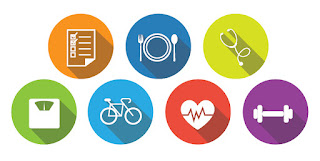6. Eat fish to help your heart. Eating fish just once or twice a week may significantly reduce the risk of heart attack. The protective value of fish comes primarily from the type of polyunsaturated fatty acids, called omega-3s, found in its oil.
Health Care Articles, major source of healthful articles for people who are concerned about their health. This blog provides interesting health articles to keep readers active and strong.
Monday, 23 April 2018
Food and Nutrition Tips #5
5. Choose skinless turkey breast—it’s just about the leanest of all meats. A three-ounce Portion has less than a gram of fat and 120 calories. Plain roast turkey is your best bet: turkey cold cuts and self-basting turkeys can be quite high in fat.
Food and Nutrition Tips #4
4. Eat tomatoes and tomato products. One four-ounce tomato supplies about one-third of your daily need of vitamin C, plus a little beta-carotene, potassium, folate and other B vitamins, iron, and fiber. Tomatoes are also rich in a carotenoid called lycopene, a potent antioxidant. The lycopene in cooked and processed tomatoes (sauce, paste, salsa, canned tomatoes) is more easily absorbed than that in raw tomatoes. Watermelon and pink grapefruit also contain lycopene.
Friday, 20 April 2018
Food and Nutrition Tips #3
3. Be a semi-vegetarian. That’s someone who supplements a steady diet of
vegetables, whole grains, legumes, fruit, and dairy products with occasional
moderate servings of beef, poultry, and fish. The potential benefits are many:
a lowered risk for heart disease, cancer, and diabetes, the maintenance of a
healthy weight, and fewer digestive complaints.
Food and Nutrition Tips #2
2. Select foods rich in carotenoids, notably beta-carotene. Research shows that these
substances may play a role in preventing disease. Their orange color tells you
that carrots, sweet potatoes, and cantaloupe are excellent sources of beta-carotene. But
so are many dark leafy greens, such as collard greens, kale, and spinach, as
well as broccoli.
Food and Nutrition Tips #1
1. Eat foods rich in vitamin C every day. An adequate intake of such foods may help
protect against cancer and possibly other diseases. Besides oranges, the best
sources of vitamin C are, in alphabetical order, asparagus, blackberries,
broccoli, cabbage, cantaloupe, cauliflower, grapefruit, kale, kiwifruit,
mangoes, mustard greens, peppers, raspberries, strawberries, tangerines, and
tomatoes.
Wednesday, 4 April 2018
Why is Health Awareness Important
Health has become one of the highly prioritized matters that people are concerned & cared about. This can be further explained by the rise in the popularity of gymnasium, yoga classes, organic food & regular organized health campaigns, programmes & projects organised by the government, private sectors as well as the NGO's. Health awareness is the need of the hour with the increasingly difficult challenges towards the health of populations in the 21’st century.
Nowadays, medical facilities for several diseases are widely available & easily accessible especially where in some places, government subsidised medical centre’s can avail treatment against diseases at minimal cost or sometimes, free of cost. However, people often tend to forget the old saying which goes that “Prevention is better than cure”. This old saying is very much valid even now. Taking necessary precaution & awareness are always better before the disaster strikes. Once the disease starts spreading, the consequences can sometimes be troublesome, dangerous & to the extent of life threatening. Ultimately, creating health awareness & taking proper prevention against disease is of utmost importance.
Subscribe to:
Comments (Atom)
